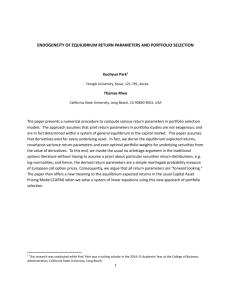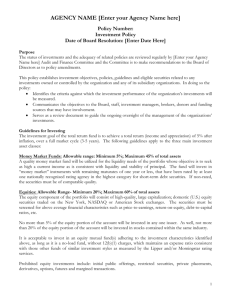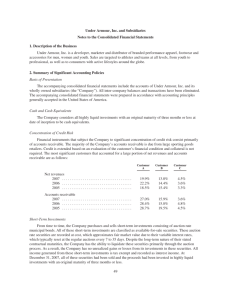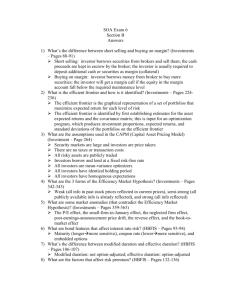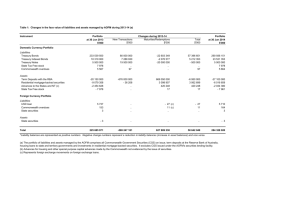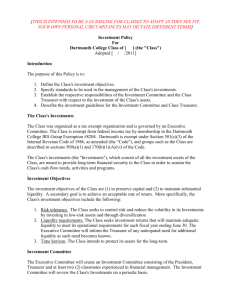Policy - California Special Districts Association
advertisement
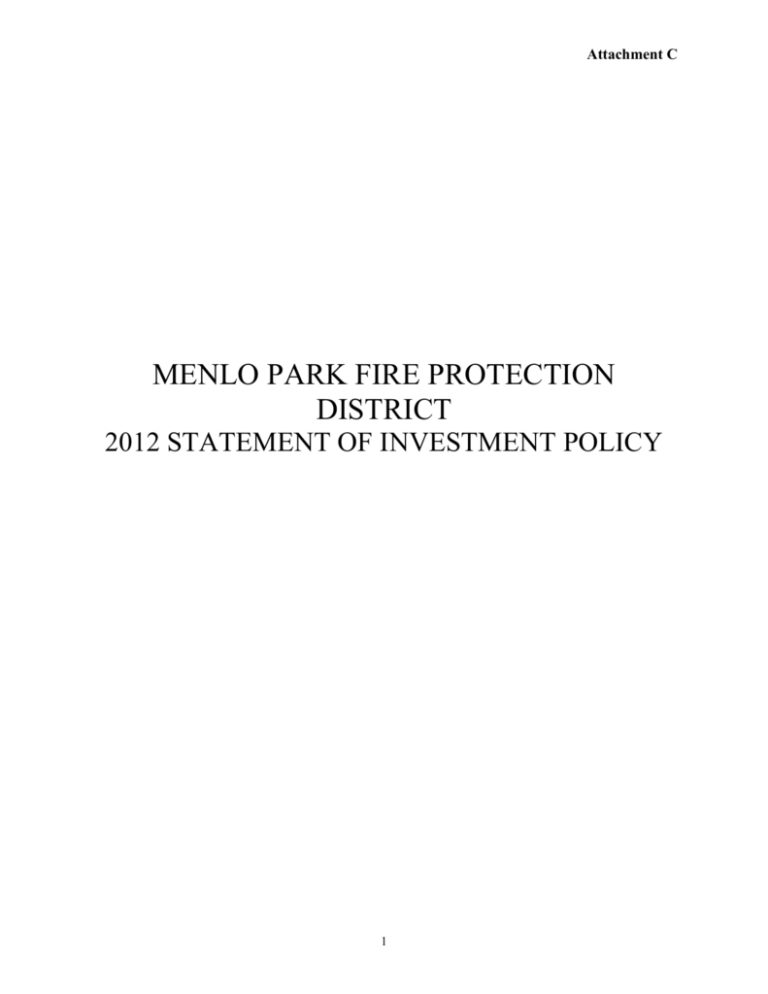
Attachment C MENLO PARK FIRE PROTECTION DISTRICT 2012 STATEMENT OF INVESTMENT POLICY 1 MENLO PARK FIRE PROTECTION DISTRICT, CALIFORNIA 2012 STATEMENT OF INVESTMENT POLICY SECTION 1.1 POLICY It is the policy of the Menlo Park Fire Protection District, CA (the “District”) to invest public funds in a manner that will provide the highest investment return with the maximum security while meeting the daily cash flow demands of the Fire District and conforming to all state and local statutes governing the investment of public funds. As a public entity, the District places particular importance on the preservation of capital and protection of District funds above other investment objectives. All investments require prior approval by the Board of Directors. SECTION 1.2 SCOPE This investment policy applies to all financial assets of the District. These funds are accounted for in the District Comprehensive Annual Financial Report and may include: General Fund Special Revenue Funds Debt Service Funds Capital Project Funds OPEB Trust Fund Any new fund established by the Fire District The Fire District Treasurer shall deposit funds in the financial institutions as directed by the Board upon recommendation of the Treasurer that yield the greatest return on investment, and shall expend those funds in accordance with applicable rules and regulations at the direction of the Board. SECTION 1.3 PRUDENCE Investments shall be made with care, skill, prudence, and diligence under the circumstances then prevailing, including, but not limited to, the general economic conditions and the anticipated needs of the District, that a prudent person acting in a like capacity and familiarity with those matters would use in the conduct of funds of a like character and with like aims, to safeguard the principal and maintain the liquidity needs of the District. SECTION 1.4 OBJECTIVE The primary objective in priority order, of the District’s investment activities shall be: SECTION 1.4-01 Safety: Safety of principal is the foremost objective of the investment program. Investments shall be undertaken in a manner that seeks to ensure the preservation of capital in the overall portfolio. The objective is to mitigate credit risk and interest rate risk summarized as follows: 2 SECTION 1.4-02 Credit Risk: This is a risk of loss due to the failure of the security issuer or backer. Credit risk may be mitigated by: Limiting investments to the safest types of securities. Pre-qualifying the financial institution, broker/dealers, intermediaries and advisors with which an entity will do business. Diversifying the investment portfolio so that potential losses on individual securities will be minimized. SECTION 1.4-03 Interest rate risk: This is a risk that the market value of securities in the portfolio will fall due to changes in general interest rates. Interest rate risk may be mitigated by: Structuring the investment portfolio so that securities mature to meet cash requirements for ongoing operations, thereby avoiding the need to sell securities on the open market before maturity. Investing operating funds primarily in shorter-term securities and intermediate term securities with maturity dates not to exceed 10 years. SECTION 1.4-04 Liquidity: The investment portfolio shall remain sufficiently liquid to meet all operating requirements that may be reasonably anticipated. This is accomplished by structuring the portfolio so that securities mature concurrent with cash needs to meet anticipated demands (static liquidity). Furthermore, since all possible cash demands cannot be anticipated, the portfolio should consist largely of securities with active secondary or resale markets (dynamic liquidity). SECTION 1.4-05 Return on Investments (Yield): The District’s investments shall be designed with the objective of attaining a market rate of return throughout the budgetary and economic cycles, taking into account the investment risk constraints and liquidity needs. Return on investment is of least importance compared to the safety and liquidity objectives described above. The core of investments is limited to relatively low risk securities in anticipation of earning a reasonable return relative to the risk being assumed. Securities shall not be sold before maturity with the following exceptions: A declining credit security could be sold early to minimize loss of principal A security swap would improve the quality, yield or target duration in the portfolio. Liquidity needs of the portfolio require that the security be sold. A capital gain would be realized that better positions the overall portfolio in achieving investment policy goals. 3 SECTION 2.01 DELEGATION OF AUTHORITY The District Treasurer, Resolution # 1146 on March 20, 2007, is appointed by the District Board. The District Treasurer is currently the District Director of Administrative Services. Pursuant to the Government Code, the District Board delegates the authority to invest or to reinvest funds, or to sell or exchange securities so purchased, to the District Treasurer for a one-year period. The District Treasurer is charged with the responsibility for carrying out the policies of the District Board and shall assume full responsibility for investment transactions until the delegation of authority is revoked or expires. The daily cash management, investment transactions and account reconciliation’s are the primary responsibilities of the District Treasurer. These activities are also carried out by other members of the Finance Department under the direction of the District Treasurer. The District Treasurer shall establish procedures for the operation consistent with this investment policy. The District Treasurer and authorized individuals acting in accordance with written procedures and the investment policy and exercising due diligence shall be relieved of personal responsibility for an individual security’s credit risk or market price changes, provided deviations from expectations are reported in a timely fashion and appropriate action is taken to control adverse developments. SECTION 2.02 ETHICS AND CONFLICT OF INTEREST Officers and employees involved in the investment process shall refrain from personal business activities that could conflict with proper execution of the investment program or which could impair their ability to make impartial decisions. Officers and employees involved in the investment process shall abide by the Conflict of Interest Code, (California Government Code Section 1090 et seq.) and the California Political Reform Act (California Government Code Section 81000 et seq.). SECTION 2.03 PERMITTED INVESTMENTS California Government Code Sections 53601, 53635 and 16429.1 governs the investments permitted for purchase by the District. Within the investments permitted by the Code, the District seeks to further restrict eligible investments to the investments listed below. Percentage limitations, where indicated, apply at the time of the purchase. Rating requirements, where indicated, apply at the time of purchase. In the event a security held by the District is subject to a rating change that brings it below the minimum specified rating requirement, the District Treasurer shall notify the District Board of the change. The course of action to be followed will then be decided on a case-by-case basis, considering such factors as the reason for the rate drop, prognosis for recovery or further rate drops, and the market price of the security. Investment maturities shall be based on review of cash flow forecasts. Maturities will be scheduled so as to permit the District to meet all projected obligations. No investment shall be made in any security, other than a security underlying a repurchase or reverse repurchase agreement, that at the time of the investment has a term remaining to maturity in excess of five years, unless the District Board of Directors has 4 granted express authority to make that investment no less than three months prior to the investment. SECTION 2.04 ELIGIBLE INVESTMENTS A. State of California Local Agency Investment Fund (“LAIF”). The District may invest in LAIF. A maximum of $50 million may be invested in this category. B. California Asset Management Trust. The District may invest in the shares in the California Asset Management Trust, so long as the portfolio is rated among the top two rating categories by one of the nationally recognized rating agencies. A maximum of $50 million may be invested in this category, net of bond proceeds. C. Certificates of Deposit. FDIC insured or fully collateralized time certificates of deposit in financial institutions located in California. Eligible investments are restricted to those issuing institutions that have been in business at least five years. The maximum term for deposits shall be one year. Investments in certificates of deposit are further limited to 20% of surplus funds or unassigned fund balance. All time deposits must be collateralized in accordance with California Government Code section 53561. The District, at its discretion, may waive the collateralization requirements for any portion of the deposit that is covered by federal insurance. D. Negotiable Certificates of Deposit. Negotiable certificates of deposit issued by a nationally or state chartered bank or a state or federal savings and loan association or by a state; licensed branch of a foreign bank; provided that the senior debt obligations of the issuing institution are rated “AA” or better by Moody’s or Standard & Poor’s. Investments in negotiable certificates of deposit are limited to 30% of the portfolio . E. Banker’s Acceptances. Banker’s acceptances issued by domestic or foreign banks, which are eligible for purchase by the Federal Reserve System. Purchases of banker’s acceptances may not exceed 180 days maturity. Eligible banker’s acceptances are restricted to issuing financial institutions with short-term paper rated in the highest category by one or more nationally recognized rating services. Investments in banker’s acceptances are further limited to 40% of the portfolio with no more than 30% of surplus invested in the banker’s acceptances of any one commercial bank. F. U.S. Government Issues. United States Treasury notes, bonds, bills, or certificates of indebtedness, or those for which the faith and credit of the United States are pledged for the payment of principal and interest. G. Federal Agency Securities. Federal agency or United States governmentsponsored enterprise obligations, participations, or other instruments, including those issued by or fully guaranteed as to principal and interest by federal agencies or United States government-sponsored enterprises. 5 H. Municipal Obligations: Bonds, notes, warrants, or other evidences of indebtedness of the State of California or of any local agency within the State of California, including bonds. RANS, BANS H. Repurchase Agreements. Repurchase agreements are to be used solely as shortterm investments not to exceed 30 days. The District may enter into repurchase agreements with primary government securities dealers rated “A” or better by two nationally recognized rating services. Counterparties should have (i) a short-term credit rating of at least “A-1/P-1”; (ii) minimum assets and capital of $25 billion in assets and $350 million in capital; (iii) five years of acceptable audited financial results; and (iv) a strong reputation among market participants. A maximum of 20% of the portfolio may be invested in this category. The following collateral restrictions will be observed: Only U.S. Treasury securities or Federal Agency securities will be acceptable collateral. All securities underlying repurchase agreements must be delivered to the District’s custodian bank versus payment or be handled under a properly executed tri-party repurchase agreement. The total market value of all collateral for each repurchase agreement must equal or exceed 102 percent of the total dollar value of the money invested by the District for the term of the investment. For any repurchase agreement with a term of more than one day, the value of the underlying securities must be reviewed on an on-going basis according to market conditions. Market value must be calculated each time there is a substitution of collateral. The District or its’ Trustee shall have perfected first security interest under the Uniform Commercial Code in all securities subject to repurchase agreements. The District shall have properly executed a Professional Services Agreement with each counter party with which it enters into repurchase agreements. I. Commercial Paper. Commercial paper of “prime” quality of the highest ranking or of the highest letter and number rating as provided by a nationally recognized statistical-rating organization (NRSRO). The entity that, issues commercial paper shall meet all of the following conditions in one of the following a. The entity meets the following criteria: i. Is organized and operating within the United States as a general corporation. ii. Have total assets in excess of $500 million. iii. Has debt other than commercial paper, if any, that is rated “A” or higher by a nationally recognized statistical-rating organization (NRSRO) (or) b. The entity meets the following criteria: i. Is organized within the United States as a special purpose corporation, trust, or limited liability company. ii. Has program wide credit enhancements including, but not limited to, over collateralization, letters of credit, or surety bond. 6 Investments in commercial paper are limited to a maximum of 25% of the portfolio. Purchases shall not exceed 10 percent of the outstanding paper of the issuing corporation. The maximum investment maturity is restricted to 270 days. J. Money Market Funds. Shares of beneficial interest issued by diversified management companies that are money market funds registered with the Securities and Exchange Commission (SEC) under the Investment Company Act of 1940 (15 U.S.C., Sec. 80a-1, et seq.). The District may invest in shares of beneficial interest issued by a company shall have met either of the following criteria: a. Attained the highest ranking or the highest letter and numerical rating provided by not less than two nationally recognized rating services. (or) b. Retained an investment advisor registered or exempt from registration with the SEC with not less than five years experience in managing money market mutual funds with assets under management in excess of five hundred million dollars ($500,000,000). The purchase price of shares of beneficial interest purchased pursuant to this subdivision shall not include any commission that the companies may charge. Investments in Money Market Funds are limited to 20% of the portfolio. K. Local Agency Bonds. Bonds, including Certificates of Participation, notes or evidences of indebtedness issued by any state, municipality or local agency, whether payable from any fund of such entity or from special revenues pledged for such payment. SECTION 3.01 ELIGIBLE INVESTMENTS FOR BOND PROCEEDS Bond proceeds shall be invested in securities permitted by the applicable bond documents. If the bond documents are silent as to the permitted investments, bond proceeds will be invested in securities permitted by this Policy. The bond proceeds will be invested on instruments that meet the investment policy criteria and the permitted investment section of the bond indenture. The investments will be made in accordance with a defined disbursement schedule. The reserve fund investments are governed by the bond indenture language and the offering circular. Investments should be made in accordance with the permitted investment criteria set forth in the offering statement. 7 SECTION 3.02 INELIGIBLE INVESTMENTS As provided in California Government Code section 53601.6, the District shall not invest any funds in inverse floaters, range notes, mortgage derived interest-only strips or in any security that could result in zero interest accrual if held to maturity. The purchase of any security not listed above, but permitted by the California Government Code is prohibited unless the District Board approves the investment either specifically or as a part of an investment program approved by the Council SECTION 3.03 BROKERS In selecting securities brokers, the District Treasurer shall conduct credit and capitalization analysis to determine that firms are adequately financed to conduct public business. SECTION 3.04 LOCAL INVESTMENT POOL POLICIES AND REPORTS To the extent there are investments in the State or California Asset Management Program (CAMP) investment pools, the District Treasurer shall review and maintain current copies of the adopted investment policies of the State and CAMP. The policies shall be reviewed for concurrence with the investment policy of the District. SECTION 3.05 SAFEKEEPING AND CUSTODY All security transactions entered into by the Menlo Park Fire Protection District, CA shall be conducted on a delivery-versus payment basis. A third party custodian designated by the District Treasurer and evidenced by safekeeping receipts will hold securities. The only exceptions to the foregoing are Local Agency Investment Pools, Certificates of Deposit, and Money Market funds since the purchased securities are not deliverable. In all cases, purchased securities shall be held in the District’s name. 8 SECTION 3.06 Internal Control The District Treasurer shall establish an annual process of independent review by an external auditor. This review will provide internal control by assuring compliance with policies and procedures. SECTION 3.07 PERFORMANCE STANDARDS The investment portfolio shall be designed with the objective of obtaining a rate of return throughout budgetary and economic cycles, commensurate with the investment risk constraints and the cash flow needs. The District will measure the portfolio’s performance against a market benchmark that is commensurate with the District’s investment risk constraints and the cash flow characteristics of the portfolio. SECTION 3.08 REPORTING The District Treasurer shall provide a monthly investment report to the District Board of Directors, which provides a clear picture of the status of the current investment portfolio, including transactions. This report will be formally submitted to the District Board of Directors each quarter at a public meeting. Schedules in the quarterly Treasurer’s Report will include the following: A list of individual securities held at the end of the reporting period by authorized investment category Average life and final maturity of all investments Earnings rate on an annualized basis Market value, par value and amortized book value Percentage of the portfolio by investment category The quarterly report shall state compliance of the portfolio to the investment policy, or manner in which the portfolio is not in compliance. The quarterly report shall also include a statement denoting the ability of the District to meet its expenditure requirements for the next six months, or provide an explanation as to why sufficient money shall, or may, not be available. SECTION 3.09 POLICY REVIEW The investment policy shall be adopted by resolution of the District Board on, at minimum, an annual basis. The investment policy shall be reviewed at least annually to ensure its consistency with the overall objections of preservation of principal, liquidity and yield, and its relevance to current law and financial and economic trends. Any amendments to the policy shall be forwarded to the District Board for approval. 9 SECTION 4.01 GLOSSARY OF TYPES OF INVESTMENTS AVAILABLE TO LOCAL GOVERNMENTS STATE INVESTMENT POOL (LAIF) The Local Agency Investment Fund (LAIF) is a voluntary program created by statute; began in 1977 as an investment alternative for California's local governments and special districts. The enabling legislation for the LAIF is Section 16429.1 et seq. of the California Government Code. This program offers local agencies the opportunity to participate in a major portfolio, which invests hundreds of millions of dollars, using the investment expertise of the Treasurer's Office investment staff at no additional cost to the taxpayer. This in-house management team is comprised of civil servants who have each worked for the State Treasurer's Office for an average of 20 years. The LAIF is part of the Pooled Money Investment Account (PMIA). The PMIA began in 1953 and oversight is provided by the Pooled Money Investment Board (PMIB) and an in-house Investment Committee. The PMIB members are the State Treasurer, Director of Finance, and State Controller. The Local Investment Advisory Board (LIAB) provides oversight for LAIF. The Board consists of five members as designated by statute. The Chairman is the State Treasurer or his designated representative. Two members qualified by training and experience in the field of investment or finance, and the State Treasurer appoints two members who are treasurers, finance or fiscal officers or business managers employed by any county, District or local district or municipal corporation of this state. The term of each appointment is two years or at the pleasure of the appointing authority. All securities are purchased under the authority of Government Code Section 16430 and 16480.4. The State Treasurer's Office takes delivery of all securities purchased on a delivery versus payment basis using a third party custodian. All investments are purchased at market and a market valuation is conducted monthly. Additionally, the PMIA has Policies, Goals and Objectives for the portfolio to make certain that our goals of Safety, Liquidity and Yield are not jeopardized and that prudent management prevails. These policies are formulated by investment staff and reviewed by both the PMIB and the LIAB on an annual basis. The State Treasurer’s Office is audited by the Bureau of State Audits on an annual basis and the resulting opinion is posted to the STO website following its publication. The Bureau of State Audits also has a continuing audit process throughout the year. All 10 investments and LAIF claims are audited on a daily basis by the State Controller’s Office as well as an in-house audit process involving three separate divisions. Under Federal Law, the State of California cannot declare bankruptcy, thereby allowing the Government Code Section 16429.3 to stand. This Section states that “moneys placed with the Treasurer for deposit in the LAIF by cities, counties, special districts, nonprofit corporations, or qualified quasi-governmental agencies shall not be subject to either of the following: (a) transfer or loan pursuant to Sections 16310, 16312, or 16313, or (b) impoundment or seizure by any state official or state agency.” During the 2002 legislative session, California Government Code Section 16429.4 was added to the LAIF’s enabling legislation. The Section states that “the right of a District, county, District and county, special district, nonprofit corporation, or qualified quasigovernmental agency to withdraw its deposited moneys from the LAIF, upon demand, may not be altered, impaired, or denied in any way, by any state official or state agency based upon the state’s failure to adopt a State Budget by July 1 of each new fiscal year.” The LAIF has grown from 293 participants and $468 million in 1977 to 2,750 participants and $19.8 billion in 2004. There is a limitation of $50 million per legal entity within an agency as of November 16, 2009. There is also a maximum of fifteen transactions, deposits or withdrawals per month. SECTION 4.02 CALIFORNIA ASSET MANAGEMENT PROGRAM (CAMP) CAMP provides California public agencies, together with any bond trustee acting on behalf of such public agency, assistance with the investment of and accounting for bond proceeds and surplus funds. For bond proceeds, the objective of CAMP is to invest and account of such proceeds in compliance with arbitrage management and rebate requirements of the Internal Revenue Service. The program includes the California Asset Management Trust, a California common law trust organized in 1989. The Trust currently offers a professionally managed money market investment portfolio, the Cash Reserve Portfolio, to provide public agencies with a convenient method of pooling funds for temporary investment pending their expenditure. The Trust also provides record keeping, custodial and arbitrage rebate calculation services for bond proceeds. As part of the program, public agencies may also establish individual, professionally managed investment accounts. The Pool seeks to attain as high a level of current income as is consistent with the preservation of principal. The Pool purchases only investments of the type in which public agencies are permitted by statute to invest surplus funds and proceeds of their own bonds. 11 SECTION 4.03 CERTIFICATES OF DEPOSITS (CD) Certificates of Deposits, sometimes known as "Jumbo Accounts" or "Fixed CD's" are savings accounts with Banks or Savings and Loans. These accounts are for a specific amount, have a set interest rate, and set maturity date. There is a substantial interest penalty if the CD is withdrawn prior to the maturity date. The State law requires Public Fund CD's to be collateralized by the financial institution at 110% with US Government notes/bonds or at 150% with quality First Trust Deeds. This collateral can be waived if Federal Insurance (FDIC for banks or FSLIC for savings and loans) is available. These federal agencies will insure each account up to $100,000. The District generally waives the collateralization requirements for the FDIC or FSLIC insurance. The waiver of collateral is a wide spread practice and will generally generate higher interest rates and provide the greatest security for the funds from the Federal Insurance Agencies. For deposits in excess of $100,000, the collateralization requirements are not waived. SECTION 4.04 NEGOTIABLE CERTIFICATE OF DEPOSIT (NCD) This investment is similar to the Fixed CD's above. However, the NCD can be sold through a broker on a "secondary market" prior to the maturity date. Normally, NCD's are issued in $500,000 and $1,000,000 amounts. The State Code limits NCD's to not more than 30% of the local agency's portfolio and to a five-year maximum term. The security is the credit worthiness of the issuer. These deposits are uninsured and uncollateralized promissory notes. SECTION 4.05 BANKER'S ACCEPTANCES (BA) A Banker's Acceptance is a time draft of invested funds, which has been drawn on and accepted for repayment by a bank. This financial instrument is generally used for short term (30 and 180 days) financing of export, import, or storage of goods. By accepting the draft (investment of District funds), the bank is liable for the payment at maturity. This bank liability makes the Banker's Acceptance a marketable investment. The State Code limits BA's to not more than 180 days to maturity and 40% of the local agency's portfolio. In addition, not more than 30% of the local agency’s portfolio may be placed in any one bank. SECTION 4.06 US TREASURY BILLS Commonly referred to as T-Bills, these are short-term marketable securities sold as obligations of the US Government. They are offered in three month, six month, nine month and one-year maturities. T-Bills do not accrue interest but are sold at a discount, and pay the face value at maturity. SECTION 4.07 US TREASURY NOTES These are marketable, interest-bearing securities sold as obligations of the US Government with original maturities of one to ten years. Interest is paid semi-annually. 12 SECTION 4.08 US TREASURY BONDS These are the same as US Treasury Notes except they have original maturities of ten years or longer. SCTION 4.09 FEDERAL AGENCY ISSUES Many Federal Government Agencies are authorized to issue short term and long term obligations that are used to finance various programs such as home loans, business loans, farm loans, etc. These Agencies were created by the Federal Government in the 1930's and have since become independent quasi-public agencies. The security for their issues is the guarantee of the Agency to pay. The Federal Government has only an implied liability to the extent that the Agency has an open credit line to borrow from the U.S. Treasury. It is widely accepted that Federal Agency issues are as secure as U.S. Government notes. There is an active secondary market available to sell these issues prior to maturity. The issues are fairly liquid depending on the prevailing market interest rates at the time of sale. Some of the more common agency notes are issued by the Federal National Mortgage Association (Fannie Mae), Federal Home Loan Banks, Federal Home Loan Mortgage Corporation (Freddie Mac), and the Federal Farm Credit Banks. SECTION 4.10 Municipal Obligations: Bonds, notes, warrants, or other evidences of indebtedness of the State of California or of any local agency within the State of California, including bonds owned, controlled, or operated by the state or local agency, or by a department, board, agency, or authority of the state or local agency. A maximum of 10 percent may be invested in municipal obligations. The maturity on these investments not exceed five years without the prior approval of the board. In addition, the issuer agency must meet the minimum state investment guidelines- have a minimum credit rating of “A” or equivalent by two of the three major rating agencies (Moody’s, Standard & Poor’s, and Fitch). SECTION 4.11 REPURCHASE AGREEMENTS (REPOS) AND REVERSE REPURCHASE AGREEMENTS A Repurchase Agreement is a short-term investment agreement to loan District funds for a fixed period in return for a fixed interest rate and secured collateral, such as U.S. Treasuries or Agency Notes. This type of investment is usually done for overnight or very short term (7 days) investment of funds left in the general operating checking account. Reverse Repurchase agreements is a short-term investment, which is used to take advantage of market interest rate changes and increase the size of the portfolio. State law was amended in 1996 to limit the use of both repurchase and reverse repurchase agreements. The District Council must approve each reverse repurchase agreement. 13 SECTION 4.12 COMMERCIAL PAPER (CP) Commercial Paper is unsecured promissory notes of industrial corporations, utilities and bank holding companies. The notes are in bearer form in amounts starting at $100,000. State law limits the District to investments in United States corporations having assets in excess of five hundred million dollars with an "A" or higher rating. Cities may not invest more than 25% of the portfolio in commercial paper and the CP’s may not exceed a term of 270 days. SECTION 4.13 MUTUAL FUNDS An investment company that pools money and can invest in a variety of securities, including fixed-income securities and money market instruments, cities may invest in Mutual Funds or Money Market funds that receive the highest ranking or the highest letter and numerical rating by two of the three largest nationally recognized rating services. The Mutual Funds must abide by the same investment restrictions and regulations that apply to public agencies in California. Money Market Funds must follow regulations specified the Security and Exchange Commission under the Investment Company Act of 1940. The District must verify that the Mutual Fund is in compliance with state laws for public agencies prior to purchasing shares. SECTION 4.14 GUARANTEED INVESTMENT CONTRACT (GIC) This is an agreement acknowledging receipt of funds for deposit, specifying terms for withdrawal and guaranteeing a rate of interest to be paid. The investment follows all state laws for the investment of public funds. 14

